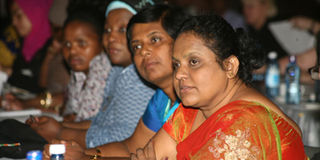Commonwealth, UN partner to bridge gender legal gap

Women parliamentarians from commonwealth countries follow proceedings at the KICC during the Commonwealth Parliamentary Association conference September 13, 2010. The Commonwealth Parliamentary Association has partnered with UN Women to promote gender equality through parliamentary engagement.
What you need to know:
- Commonwealth Parliamentary Association has partnered with UN Women to promote gender equality through parliamentary engagement.
- The partnership will see parliamentarians benefit from training and development programmes on gender equality.
- It aims at ensuring legal needs of women and girls are better addressed through parliamentary debate and legislation.
The Commonwealth Parliamentary Association has partnered with UN Women to promote gender equality through parliamentary engagement.
The partnership will see Commonwealth parliamentarians benefit from training and development programmes on gender equality. It aims at ensuring legal needs of women and girls are better addressed through parliamentary debate and legislation.
A memorandum of understanding (MoU) has been signed by the Commonwealth Parliamentary Association (CPA), with its membership of almost 180 legislatures; the Commonwealth Women Parliamentarians (CWP) network; and UN Women. The partnership seeks to eradicate discriminatory laws, particularly towards achieving the Sustainable Development Goal (SDG) 5.
The MoU was signed by CPA Secretary-General Stephen Twigg and UN Women Executive Director Sima Sami Bahous. Ms Bahous said more than 2.5 billion women and girls are affected globally by unequal laws or a lack of legal protection.
“The full realisation of women’s rights is dependent on the repeal and eradication of such laws. UN Women is committed to structured engagement to achieve legislative and constitutional reforms for just, peaceful and inclusive societies; environmental and climate justice; equal participation in decision-making at all levels; universal access to essential public services; and economic prosperity for all,” she said.
Ms Bahous added that the partnership is a strategic opportunity for the achievement of shared goals of gender equality and the empowerment of women, as well as making progress towards equality in law for women and girls by 2030.
CWP network chairperson Zainab Gimba said the MoU is a vital step towards strengthening the global gender inequality. “By working together with UN Women, the CWP will be able to provide expertise and training in gender equality for the CPA’s wider membership. This will strengthen parliamentarians’ ability to pass gender equal legislation and implement the necessary laws at all levels to remove discrimination,” said Dr Gimba.
Equal participation
She committed that her organisation will continue promoting women’s equal participation at all levels and improve awareness and ability of all parliamentarians, regardless of gender, to include a gender perspective in all aspects of legislation, oversight and representation, and help parliaments become gender-sensitive institutions.
Through the initiative, legislators will formulate and review appropriate legislation to pursue gender equality and women empowerment, particularly in relation to the SDGs. It will also help them strengthen efforts to address discriminatory legislation, deepen public debate and enhance accountability.
The lawmakers will also advance skills to combat discriminatory legislation, review gender-sensitive legislation and mainstream gender and the rule of law. In addition, it will bring women's issues to the fore in parliamentary debate and legislation, and facilitate international exchange to share best practice in pursuit of gender equality.
Research undertaken by the Commonwealth Secretariat in preparation for the Women’s Affairs Ministers meeting held in Kenya in 2019 showed that only one in five Commonwealth parliamentarians was a woman. Of every 10 girls, only seven attend secondary school. Thirty-two countries do not mandate equal pay for work of equal value, and 19 do not have laws prohibiting early marriage.





